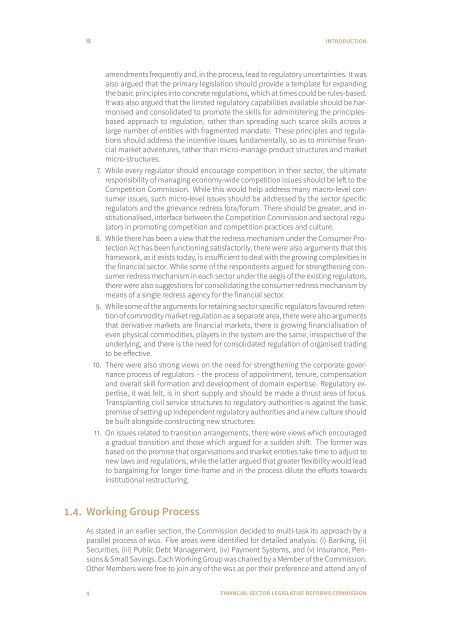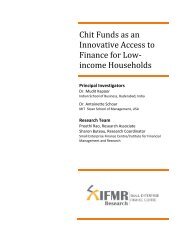Government of India Volume I: Analysis and Recommendations
Government of India Volume I: Analysis and Recommendations
Government of India Volume I: Analysis and Recommendations
You also want an ePaper? Increase the reach of your titles
YUMPU automatically turns print PDFs into web optimized ePapers that Google loves.
INTRODUCTION<br />
amendments frequently <strong>and</strong>, in the process, lead to regulatory uncertainties. It was<br />
also argued that the primary legislation should provide a template for exp<strong>and</strong>ing<br />
the basic principles into concrete regulations, which at times could be rules-based.<br />
It was also argued that the limited regulatory capabilities available should be harmonised<br />
<strong>and</strong> consolidated to promote the skills for administering the principlesbased<br />
approach to regulation, rather than spreading such scarce skills across a<br />
large number <strong>of</strong> entities with fragmented m<strong>and</strong>ate. These principles <strong>and</strong> regulations<br />
should address the incentive issues fundamentally, so as to minimise financial<br />
market adventures, rather than micro-manage product structures <strong>and</strong> market<br />
micro-structures.<br />
7. While every regulator should encourage competition in their sector, the ultimate<br />
responsibility <strong>of</strong> managing economy-wide competition issues should be left to the<br />
Competition Commission. While this would help address many macro-level consumer<br />
issues, such micro-level issues should be addressed by the sector specific<br />
regulators <strong>and</strong> the grievance redress fora/forum. There should be greater, <strong>and</strong> institutionalised,<br />
interface between the Competition Commission <strong>and</strong> sectoral regulators<br />
in promoting competition <strong>and</strong> competition practices <strong>and</strong> culture.<br />
8. While there has been a view that the redress mechanism under the Consumer Protection<br />
Act has been functioning satisfactorily, there were also arguments that this<br />
framework, as it exists today, is insufficient to deal with the growing complexities in<br />
the financial sector. While some <strong>of</strong> the respondents argued for strengthening consumer<br />
redress mechanism in each sector under the aegis <strong>of</strong> the existing regulators,<br />
there were also suggestions for consolidating the consumer redress mechanism by<br />
means <strong>of</strong> a single redress agency for the financial sector.<br />
9. While some <strong>of</strong> the arguments for retaining sector specific regulators favoured retention<br />
<strong>of</strong> commodity market regulation as a separate area, there were also arguments<br />
that derivative markets are financial markets, there is growing financialisation <strong>of</strong><br />
even physical commodities, players in the system are the same, irrespective <strong>of</strong> the<br />
underlying, <strong>and</strong> there is the need for consolidated regulation <strong>of</strong> organised trading<br />
to be effective.<br />
10. There were also strong views on the need for strengthening the corporate governance<br />
process <strong>of</strong> regulators – the process <strong>of</strong> appointment, tenure, compensation<br />
<strong>and</strong> overall skill formation <strong>and</strong> development <strong>of</strong> domain expertise. Regulatory expertise,<br />
it was felt, is in short supply <strong>and</strong> should be made a thrust area <strong>of</strong> focus.<br />
Transplanting civil service structures to regulatory authorities is against the basic<br />
premise <strong>of</strong> setting up independent regulatory authorities <strong>and</strong> a new culture should<br />
be built alongside constructing new structures.<br />
11. On issues related to transition arrangements, there were views which encouraged<br />
a gradual transition <strong>and</strong> those which argued for a sudden shift. The former was<br />
based on the premise that organisations <strong>and</strong> market entities take time to adjust to<br />
new laws <strong>and</strong> regulations, while the latter argued that greater flexibility would lead<br />
to bargaining for longer time-frame <strong>and</strong> in the process dilute the efforts towards<br />
institutional restructuring.<br />
1.4. Working Group Process<br />
As stated in an earlier section, the Commission decided to multi-task its approach by a<br />
parallel process <strong>of</strong> WGs. Five areas were identified for detailed analysis: (i) Banking, (ii)<br />
Securities, (iii) Public Debt Management, (iv) Payment Systems, <strong>and</strong> (v) Insurance, Pensions<br />
& Small Savings. Each Working Group was chaired by a Member <strong>of</strong> the Commission.<br />
Other Members were free to join any <strong>of</strong> the WGs as per their preference <strong>and</strong> attend any <strong>of</strong><br />
4 FINANCIAL SECTOR LEGISLATIVE REFORMS COMMISSION



